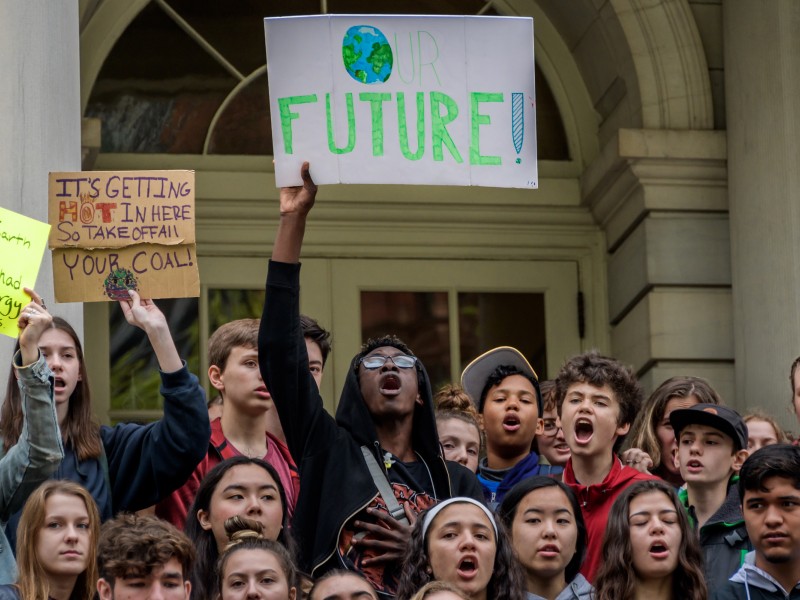Fred Krupp, who at the time was the executive director of the Environmental Defense Fund, said the moment was a wake-up call.
"When that letter was sent, our staff wasn't diverse and our board wasn't diverse," he said. "It did cause us to stop and think about things differently."
An uphill battle
Those changes weren't enough, said Krupp, who is now the president of the Environmental Defense Fund. The events of the past week have demonstrated that mainstream environmental groups have plenty more work to do — including efforts to rebuild trust in marginalized communities, he added.
"There's a lot more room for us to partner with front-line groups and bring what we can to the table to support their work," Krupp said. "That's the way you build trust, because mere words or statements or social media posts are woefully inadequate."
The NAACP is one of the groups with the biggest presences on the front lines of environmental activism. Bullard credits Patterson of the NAACP Environmental and Climate Justice Program with much of the progress that has been made in prioritizing climate justice as one of the civil rights group's core missions.
Patterson said many climate change organizations and environmental leaders are still slow to fully embrace intersectionality as part of their mission. Part of the struggle likely owes to how the modern environmental movement evolved, she said.
"The roots of the traditional environmental movement came out of conservation of flora, fauna and wild spaces," she said. "It's a pretty big shift for these people to think about human rights and the ways that environmental racism affects communities."
The concept of environmentalism, which can be traced to the late Middle Ages in Europe, was hardly built on principles of equality. Rather, early conservationists largely campaigned to keep forests and parks pristine for their own elite enjoyment, according to Joyce Chaplin, a professor of early American history at Harvard University.
"Overwhelmingly, the conservation that was done favored powerful people," she said. "The classic example would be forests that were conserved for hunting game as private entertainment for aristocrats and monarchs."
Similar dynamics drove conservation efforts in the U.S. in the early 20th century and influenced the thinking and research of early giants in the movement, including President Theodore Roosevelt and Gifford Pinchot, the man he named chief forester of the redefined U.S. Forest Service.
"The ideas about which communities benefit from conservation and national parks basically builds from old European logic about who is privileged enough to go walk among the trees," Chaplin said.
That legacy persists today, whether or not people realize it, said Ayana Elizabeth Johnson, a marine biologist who is the founder and CEO of Ocean Collectiv, a science and policy consulting firm, and the Urban Ocean Lab, a think tank for coastal cities.
"There are so many people who care about justice and care about climate change, but they still don't get it — they still don't see the connection," she said. "It's not like the climate community has a problem with wild racists and horrible people. These are the good ones, and they're still not quite there."
Johnson wrote an essay last week in The Washington Post about the difficulties of existing beneath the layers of existential crises caused by climate change and racism. Climate change can't be solved, she argued, without also addressing racial justice.
"I understand the instinct to want to focus just on climate change, because that's already so complicated," she said. "But that's naive, because it implies that these issues are not inextricably interwoven."
And the links can't be overlooked, because many of the climate risks faced by black communities, and other communities of color, are magnified because of other deep-seated social and economic issues.
"When America has a cold, black folks have the flu," said the Rev. Michael Malcom, executive director of Alabama Interfaith Power and Light, a religious organization based in Birmingham that aims to mobilize congregations throughout Alabama to address climate change.
In addition to helping communities build strategies to increase energy efficiency and shrink their emissions output, the organization also advocates for policy changes at the state level to combat global warming and environmental racism.
Malcom said his work in the community demonstrated that socioeconomic issues, health issues and climate issues can't be divorced from one another.
"Three words connect it all: I can't breathe," Malcom said, referring to George Floyd's final words as a white Minneapolis police officer dug his knee into his neck for more than eight minutes. "Whether it's the pressure we've felt through policy or the violence we face from people who are supposed to protect and serve us or the brutality we face from pollution, it has always been 'I can't breathe.'"
But Malcom said this moment in history feels different, and he's hopeful that mass protests in almost every major city in the country, as well as the widespread calls for reform, will lead to lasting change.
Bullard agreed, saying the intergenerational makeup of the people protesting and demanding change fuels his optimism. Youth- and student-led movements have played important roles in changing the course of the country throughout history, he added. And he is more than happy to welcome a new generation into the fight for environmental justice.
"I've been doing this for 40-plus years, and I've always said that when you fight for justice, it's not a sprint, it's a marathon," he said. "But it's actually more of a marathon relay. You run your 26.2 miles and then you pass the baton on to the next generation."
By Denise Chow
















Comment
Reply